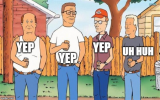Good stuff you guys. Long one here...
@Joker , I agree that
science should be distinguished from scientism should be distinguished from "authoritarian" gov't public health messaging (which for good/bad is about manipulating the public, sometimes with good intent, sometimes with corrupt intent) should be distinguished from Big Pharma (which can provide 'public goods' but can also be corrupted by its own interests) should be distinguished from people with pet science ideas (which are usually about their self-interests and
might be 'valid' in some way, but they haven't done the experiments or had external verification) and so on. It's a mess.
What seems different about the last 10-20 years especially is a growing ubiquitous
skepticism and cynicism across the board of all power and institutions ranging from gov't to corporations to science itself. The average person is not wrong that corruption and lying happens all over for whatever group's financial or political self-interest.
Skepticism is necessary to a degree to not be duped in life or to not make a fatal error based on bad information. Skepticism is also necessary in science, and that's what distinguishes the long-term scientific process: it can learn and self-correct very rapidly compared to tribal knowledge, personal opinion, ideology, etc. A charismatic 'science author' may have a cool pet theory (say, which contradicts mainstream science), and he/she might win a lot of non-scientific minds and sell a lot of books. But that's not science unless and until it gets vetted in a larger community over time. (Of course, that can be difficult if the mainstream rejects it out of hand, but if it has some merit or glimmer of truth, it's likely someone will take it up as there are always curious researchers on the fringes.)
Trust is also necessary to survive in life and in science. After 10 or 1000 experiments show something similar, maybe we can trust the results or theory (for the time being). That doesn't mean the theory is fully objective or infallible or universal or that some situation could flip it on its head and change how we see things fundamentally. That doesn't mean that some verified theory or process couldn't be co-opted or messaged in a way that serves some public or business interest. (Are m-RNAs vaccines or something else? Are they safe or is that still an unknown?)
But it seems to me that
total skepticism, cynicism and bad faith about whichever institution, group, or idea one distrusts or hates means we fully reject groups or "powers" that are different from or opaque to or seemingly opposed to me/us, even if there is some good to them. "
They are up to no good, see, there's all this evidence! They want to take X from us and do Y to us..." That's also not science, even if the impulse is understandable. And if that were the case, I understand resisting and fighting those Master/Boss/Goliath Villains (take your pick).
There actually is manipulation, lying, fixing, corruption, back-room deals, quid-pro-quos, dark money, now entrenched in what seemed to be 'good faith institutions' to varying degrees. We tend to ignore it or give it a pass when it's in our favor. Or we relent and say "That's just the way it is. You got to play the game or you just get screwed." Which is also true...
if that's the only game we can imagine.
Now with social media, we can cherry pick (or the algorithm cherry picks) information that confirms and reinforces our leanings, beliefs, biases, and traumas. It
appears like there is a ton of confirming 'evidence' (no matter what 'side') because it is mainlined right into our brains. We get jacked up on it. Anonymity means folks can throw whatever into the fire without consequences. No elder or authority is going to chastise you or shame you for being a troll or stirring things up just because it gets you off from your parent's basement.
I think some skepticism of all institutions is justified. When it comes to something like Covid and the vaccines, the mainstream media and gov't failed to maintain neutrality and convey the actual nuances and uncertainties. Rather: Do this; oh, now don't do that. Fear this; now don't fear that. The vaccines are all the same; oh, they're different. Never mix-and-match, mix-and-match is actually better. The pandemic is getting worse, it's better now, it's horrible again, it's never going away. Granted none of us (experts included) have lived through this kind of thing. The messaging was fucked up.
The problem is that gov't didn't trust the populace as adults who could listen to nuance, uncertainty, and even indecision and make our own somewhat-informed decisions. They bullshitted to get people to do or not do things, much like a parent might to a child. Most people don't understand the vaccine trial process vs. public health messaging. 'Authority' becomes a black box that lies for one reason or another.

